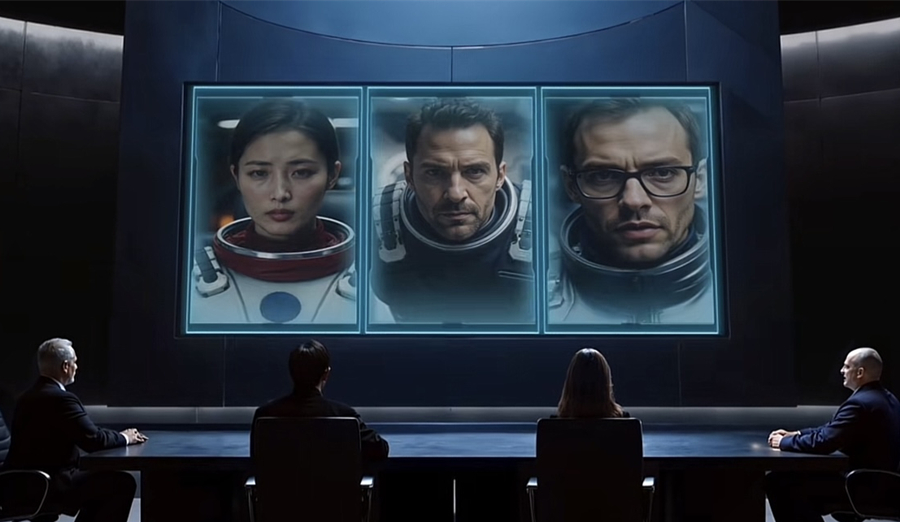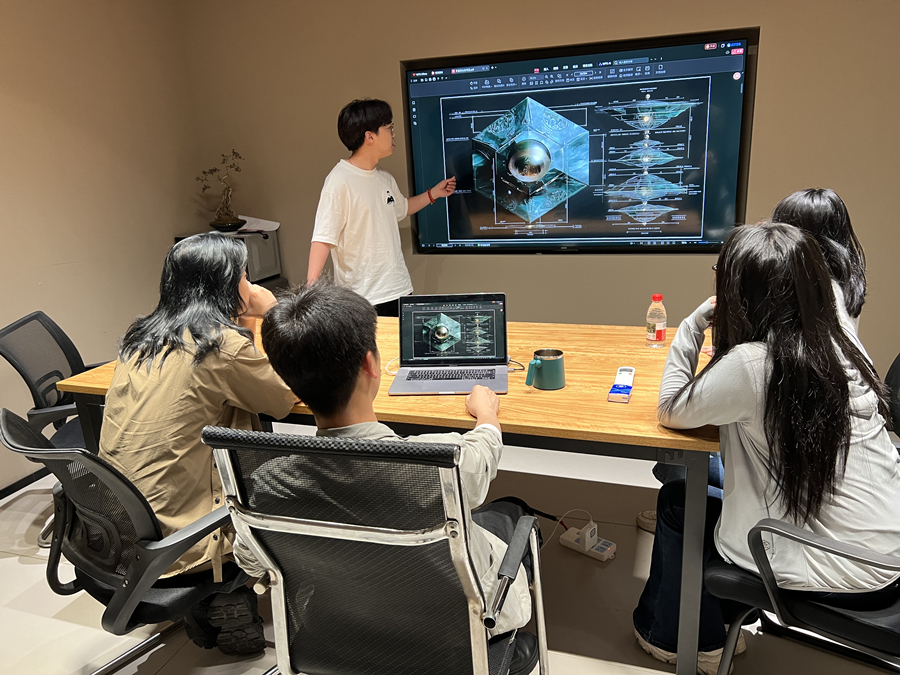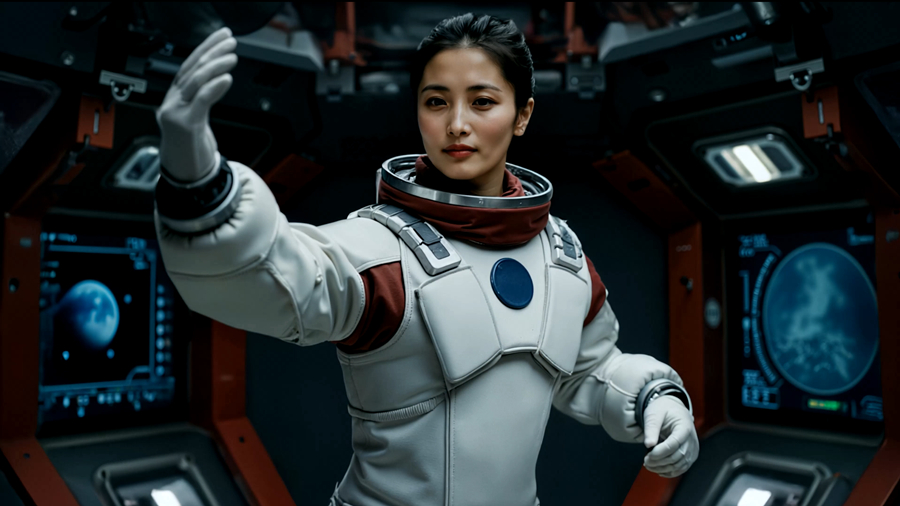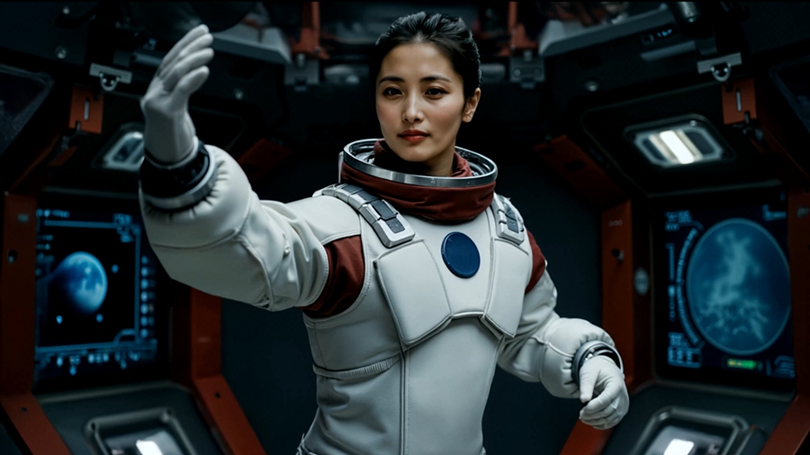"The Sun That Fell," China's first AI-generated science fiction micro drama, has drawn significant attention from viewers and industry insiders since its online debut on April 30, marking a breakthrough in AI-driven content production.

A still from "The Sun That Fell." [Image courtesy of Wukong Media]
Director Zheng Hang told China.org.cn the sci-fi series contains more than 50 characters and 200 scenes across 30 episodes. Each episode follows the "micro drama" format popular in China, with ultra-short installments running just two to three minutes in length.
Every step of the project — from generating scenes and creating characters to filming and visual effects — was handled entirely by AI, according to Zheng. This approach dramatically reduced both production time and costs, allowing the team to finish all episodes in just three months.
The Chinese short-video platform Douyin selected Zheng's project for its premium original content program after reviewing multiple proposals. Platform executives cited "The Sun That Fell's" compelling narrative structure and dramatic tension as key factors in their decision to greenlight the production.
Adaptation to the micro-drama format demanded nearly half the content be newly created, ensuring each brief episode sustained the intensity and narrative momentum this condensed storytelling style requires.
The micro drama, based on Zhang Ran's Chinese Nebula Award-winning novella, depicts a future where solar storms cripple Earth's energy supply. In the story, humanity constructs three space stations to harness solar power, but rival factions weaponize these installations. The AI-produced series combines disaster spectacle with philosophical questions as Earth battles both cosmic dangers and technological threats. Douyin, Sichuan New Media Group and Wukong Media co-produced the project.

A photo captures director Zheng Hang during the production of "The Sun That Fell." [Photo provided to China.org.cn]
Zheng said the script became the production's biggest challenge due to a compressed timeline of just over a month, having originally targeted a Spring Festival release.
The team wrote and produced simultaneously, revising the script more than a dozen times and redoing completed scenes when necessary. The production faced additional technical hurdles with scenes involving multiple characters and group interactions, which current AI technology struggles to render convincingly.
Several space station sequences required multiple redesigns, and creating the station's collapse demanded extra effort because the novella provided limited descriptive details.
To overcome these limitations, the production team utilized nearly all major AI models currently available, combining their various capabilities to achieve the final result.
"The Sun That Fell" has garnered over 10 million views so far on Douyin, impressing viewers with visual effects and character performances that approach human-created quality.
"Honestly, I'm surprised," said author Zhang Ran. "Sci-fi has always been among the hardest genres to adapt. Future, space and extraterrestrial elements always demand extensive visual effects, which traditionally meant prohibitive costs. Many writers instinctively avoided such ambitious concepts. But AI-generated content (AIGC) now liberates creators. This breakthrough empowers all storytellers to think bigger."
Director Zheng sees similar potential, noting that AIGC technology can enable adaptation of literary works that lack top-tier IP status.

A photo captures a creative meeting during the production of "The Sun That Fell." [Photo provided to China.org.cn]
"AIGC provides more than just simple cost reduction; it creates a more efficient feedback loop between content and commerce," he said. "We can achieve bolder ideas at lower costs and quickly receive market feedback, forming a new business model that feeds back into the creative process."
"Through this efficient, high-quality sci-fi content, we can gradually build reputation, cultivate audience taste and ultimately establish stable paying habits among viewers, enabling continuous output," Zheng added.
Dong Jing, assistant to the chair of the Chinese Nebula Awards organizing committee, said that high costs, long timelines and risks have long challenged sci-fi adaptations.
"AIGC is reshaping that model, which is significant," he said. "The project marks a milestone and signals new possibilities for the sci-fi industry."
Dong Renwei, a prominent figure in China's sci-fi community and co-founder of the Chinese Nebula Awards, described the AI-produced series as a significant milestone for adapting Chinese sci-fi, following major adaptations like "The Three-Body Problem" and "The Wandering Earth."
He noted that numerous classic works by Chinese science fiction authors remain unadapted, with the Chinese Nebula Awards archive serving as a repository of high-quality content awaiting screen adaptation.
Wukong Media's previous AI-generated sci-fi project "Awakening" garnered over 50 million views in 2024. Following the release of "The Sun That Fell," the production company has secured agreements with more than 10 Chinese science fiction authors to develop additional AI-generated content series.
Zheng said his team plans to eventually produce feature-length films using AI, but recognized that audience expectations for theatrical releases would require further technological advancement.

A still from "The Sun That Fell." [Image courtesy of Wukong Media]
Zheng downplayed concerns about AI replacing human talent in filmmaking as "somewhat sensational," though he acknowledged the possibility of significant industry transformation through gradual integration of the technologies.
"The technology is evolving rapidly," he said.


 Share:
Share: 




 京公网安备 11010802027341号
京公网安备 11010802027341号